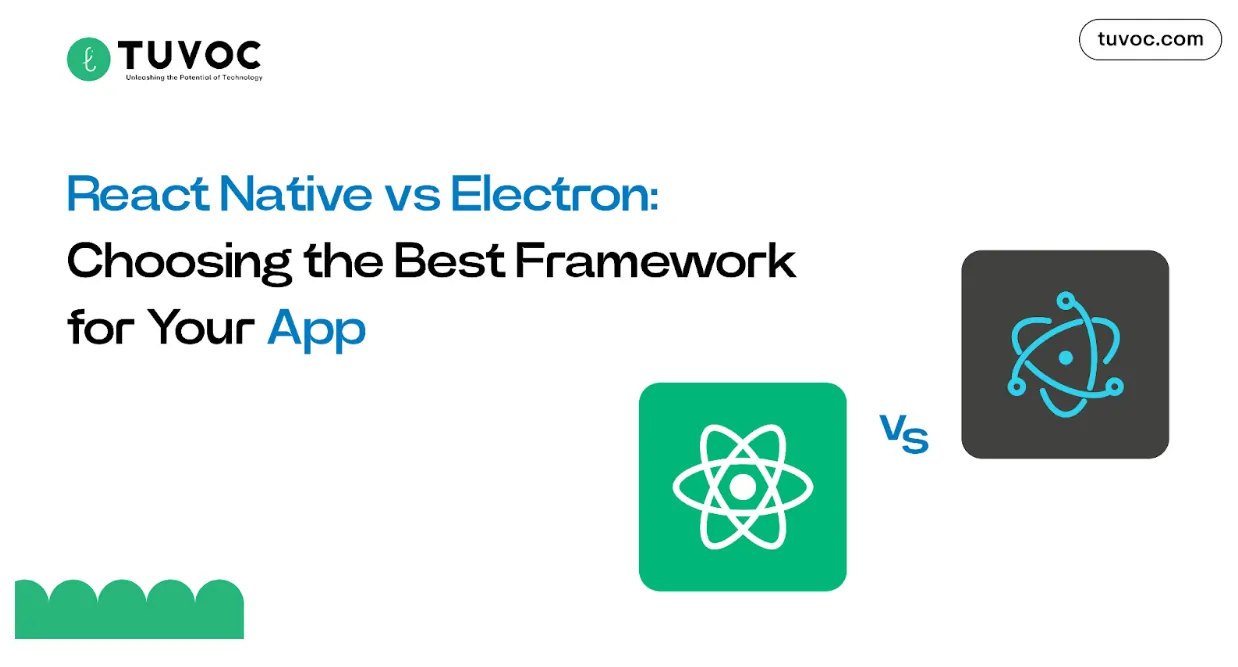In our current fast-paced digital environment, choosing the appropriate app development framework is crucial for every business. Whether you are a startup targeting quick market entry or an established company seeking to expand your services, deciding between React Native app development and Electron app development can greatly influence your product’s performance, user experience, and scalability prospects.
Cross-platform solutions have become a necessity as companies strive to deliver seamless experiences across multiple devices. Frameworks like React Native vs Electron not only cater to different target platforms but also embody distinct development philosophies and ecosystems. In this blog, we’ll provide an in-depth React Native vs Electron comparison to help you answer questions like:
- Which app development framework is better: React Native or Electron?
- Is React Native better for mobile apps than Electron for desktop apps?
- When should you choose React Native over Electron?
By exploring key differences, performance metrics, developer ecosystems, and practical use cases, you’ll be equipped to make an informed decision. Plus, we’ll share insights on why many businesses choose to hire React native developers or even engage a full React Native development company like Tuvoc Technologies for their projects.
Overview of React Native and Electron
What is React Native?
React Native is an open-source framework developed by Facebook that enables developers to build high-performance, cross-platform mobile apps using JavaScript and React. Its core purpose is to allow code reusability between iOS and Android platforms, which makes it an ideal choice for React native app development services. Some key features include:
- Reusability of Code: Write once and deploy on both major mobile platforms, significantly reducing development time.
- Native-like Performance: By leveraging native components, apps built with React Native closely mirror the performance of fully native apps.
- Robust Community Support: A large pool of pre-built libraries, components, and comprehensive documentation makes it easier for businesses to hire React native developers for hire and start development quickly.
React Native’s popularity among startups and large enterprises alike is a testament to its efficacy in creating engaging and responsive mobile applications.
What is Electron?
Electron is a framework created by GitHub that allows developers to build desktop applications using web technologies! namely HTML, CSS, and JavaScript. It is particularly suited for those looking to create cross-platform desktop apps with a single codebase. Key features of Electron include:
- Cross-Platform Desktop Development: Build applications for Windows, macOS, and Linux using one unified codebase.
- Integration with Node.js: Electron seamlessly integrates Node.js for backend functionalities, enabling powerful desktop applications with web-like user interfaces.
- Familiar Web Technologies: Developers who are already skilled in web development can easily transition to Electron app development, creating apps that offer a rich user experience similar to popular tools like Visual Studio Code and Slack.
Electron effectively merges web and native features, making it an ideal option for desktop apps, particularly when developers prioritize a cohesive development experience over performance compromises.
Comparing React Native and Electron
When selecting between React Native and Electron, it is important to evaluate how each framework meets various development requirements. Below is a detailed examination of their main distinctions:

Platforms Supported
- React Native:
- Target Platforms: Mainly targets mobile platforms—iOS and Android—making it perfect for businesses emphasizing mobile-first approaches.
- Extended Support: Through projects such as React Native for Web and community-led efforts for desktop (macOS/Windows), React Native apps can be expanded beyond mobile devices.
- Electron:
- Target Platforms: Electron is crafted for desktop app development, allowing you to create applications that operate on Windows, macOS, and Linux using a unified codebase.
- Web Technologies: By utilizing HTML, CSS, and JavaScript, Electron provides web developers with an easy method to build powerful desktop applications.
Performance
- React Native:
- Near-Native Speed: By using native UI components and bridging JavaScript with platform-specific code, React Native offers performance that is close to native apps—ideal for graphics-rich mobile applications.
- Optimizations: Recent improvements (e.g., Hermes engine and Concurrent Rendering) have further enhanced its speed and memory usage.
- Electron:
- Resource Intensity: Electron applications integrate the Chromium browser engine and Node.js runtime, potentially leading to increased memory consumption and reduced performance for demanding tasks. Nevertheless, it shines in delivering feature-rich desktop experiences where these compromises are permissible. (bacancytechnology.com).
Use Cases
- React Native:
- Ideal For: Mobile apps such as social media platforms, e-commerce solutions, on-demand services, and any project that demands a native feel and high performance on smartphones.
- Real-World Adoption: Major companies like Facebook, Instagram, and Walmart have adopted React Native for their mobile apps, underscoring its reliability and performance ( concettolabs.com).
- Electron:
- Ideal For: Cross-platform desktop applications like text editors (e.g., Visual Studio Code), communication tools (e.g., Slack), and productivity software that benefit from a single, unified codebase across all desktop operating systems.
- Advantages: Its ability to access native system features (via Node.js) makes it a strong candidate for applications requiring deep OS integration.
Developer Ecosystem
- React Native:
- Community & Libraries: Backed by Facebook, React Native boasts a massive community with extensive libraries and pre-built components. This ecosystem makes it easier to hire React native developers and leverage community solutions.
- Tooling: Integration with tools like Expo accelerates development and simplifies deployment ( stackshare.io).
- Electron:
- Mature Ecosystem: With strong support from GitHub and a vibrant ecosystem of plugins and modules, Electron provides a comprehensive toolkit for desktop development.
- Documentation & Resources: Although some developers find Electron’s documentation less cohesive, the community contributions and third-party tutorials fill in the gaps, enabling effective app development.
Learning Curve
- React Native:
- Accessibility: Developers familiar with JavaScript and React find React Native relatively easy to pick up. Its component-based architecture promotes code reusability and rapid development.
- Training Resources: Extensive tutorials, courses, and a large community ensure that new developers can quickly overcome initial hurdles.
- Electron:
- Web Development Familiarity: For developers with a strong background in web technologies, Electron offers a smoother transition to desktop app development.
- Configuration Complexity: The need to manage both the browser and Node.js environments can add complexity, but starter kits like Electron Forge help streamline the process.
When to Choose React Native or Electron?
- Choose React Native if:
- Your primary target is mobile users.
- You require near-native performance and a native feel in your mobile app.
- You want to leverage a vast JavaScript ecosystem and rapidly scale with an extensive pool of skilled developers.
- Choose Electron if:
- Your focus is on building feature-rich desktop applications.
- A unified codebase for Windows, macOS, and Linux is essential.
- You need to integrate deep OS functionalities (like file system access) using Node.js.
These insights underscore that the decision should be driven by project requirements. If your app needs to operate on mobile devices with high performance, React native app development is the way to go. Conversely, if a robust desktop experience is what you’re after, Electron is a solid choice.
By understanding these key differences and leveraging industry insights, businesses can confidently choose the framework that best aligns with their goals, whether they decide to engage a full-service React Native development company or explore Electron for desktop solutions.
Benefits of Hiring Developers from Tuvoc Technologies
When it comes to transforming your app idea into a market-ready solution, partnering with a trusted development firm is key. Tuvoc Technologies stands out as a leading custom software development partner with deep expertise in both React Native and Electron. Here’s why hiring developers from Tuvoc Technologies can be a game changer for your project:
Expertise in Multiple Frameworks
Tuvoc Technologies boasts a team of skilled developers who are proficient in both React native app development and Electron app development services. Whether you’re looking to build a high-performance mobile app or a feature-rich desktop application, their technical know-how ensures your project is built using the most effective tools and methodologies.
Flexible Engagement Models
Understanding that every project is unique, Tuvoc Technologies offers flexible engagement models. You can choose to:
Hire dedicated Node.js developers or Hire React native developers for hire
This flexibility allows you to scale your team as needed, ensuring you only pay for the resources you require while maintaining full control over project timelines and quality.
Proven Track Record
As a top React Native development company, Tuvoc Technologies has successfully delivered numerous projects across various industries. Their portfolio demonstrates a consistent ability to produce robust, scalable, and cost-effective solutions that meet modern performance standards and deliver exceptional user experiences.
Cost-Effective Solutions
By streamlining development processes and leveraging code reusability across platforms, Tuvoc Technologies helps reduce time-to-market. This not only cuts costs but also allows you to quickly adapt to changing market demands—ideal for startups and established enterprises alike.
Commitment to Quality and Innovation
Staying ahead in a competitive landscape requires constant innovation. Tuvoc Technologies continuously invests in the latest tools and technologies, ensuring that your app is not only built to current standards but is also scalable and future-proof. This commitment to quality means that whether you need React native app development services or Electron desktop solutions, you’re partnering with a team that prioritizes excellence at every step.
Related Post: https://baddiehubpro.com/what-is-baddiehub-and-how-it-works/
Conclusion
Choosing between React Native and Electron ultimately depends on your project’s requirements:
- React Native is the clear choice for mobile-first applications that demand near-native performance, rapid development, and a seamless user experience on iOS and Android.
- Electron excels in building rich, feature-packed desktop applications using web technologies, making it ideal for cross-platform desktop environments.
At Tuvoc Technologies, we understand that the future of app development lies in multi-platform versatility. Our expertise spans both frameworks, ensuring that your project is developed with precision—whether you need to build a high-performance mobile app or a robust desktop solution.
By partnering with Tuvoc Technologies, you gain access to a team of experts dedicated to turning your vision into reality. With flexible engagement models, a proven track record, and a commitment to innovation, we provide the ideal blend of technical excellence and cost efficiency.
Ready to bring your app idea to life? Contact Tuvoc Technologies today to hire expert developers who can build the perfect solution for your business!






2 thoughts on “React Native vs Electron: Choosing the Best Framework for Your App”